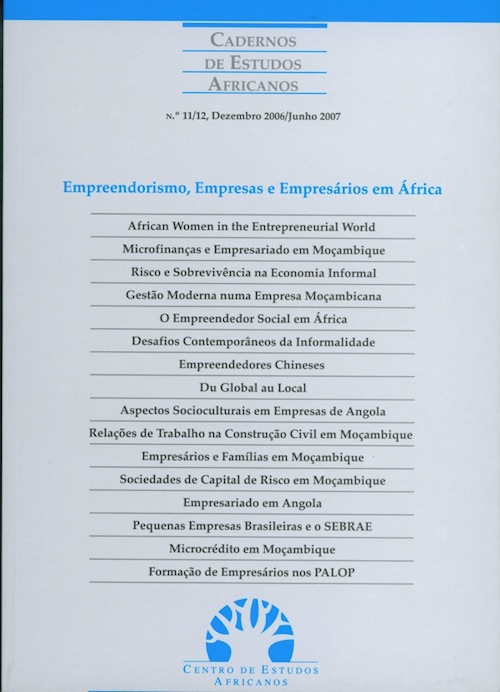Accumulation, Risk and Survival in the Informal Economy: the candongueiros in Luanda
DOI:
https://doi.org/10.4000/cea.928Keywords:
Economia informal, Transporte urbano, Mobilidade social, Luanda, AngolaAbstract
Over the last 25 years there have been significant changes in the Luanda’s urban landscape due to the prolonged civil war and the political and economic transformations. There was a decline in the formal supply of road transport and this provided the opportunity for the arrival and accelerated growth of minibuses as the most fitting means of urban transport. This changing process also gave rise to new actors, to new models for exploiting the activity, new forms of employment contracts and new forms of social organization. This communication explores the emerging nature of Luanda’s minibus taxi industry. The purpose of this study is to assess how far these activities contribute to satisfying the mobility needs of Luanda’s population, to generating household income and employment and to the professional and social integration of a large number of Luanda’s citizens. A further objective is to identify the actors involved, the kinds of relationships that exist as well as the patterns in working activities. This paper describes and characterizes the above mentioned transformation process, based on a bibliography review, direct observation and information collected in the field from September 2003 to August 2004. Systematic direct observation, made on more than 50 trips on short and long routes, has been another important source of information. Results are also reported from documental analyses and from a series of in‑depth interviews with institutional actors and with the main operators involved in the activities (fare collectors, drivers, owners, passengers).
References
Barrev, R. (1993), The Role of the World Bank in the Development of Urban Transport in Sub‑Saharan Africa, SSATP Working Paper, 01, Washington.
Barrev, J. (2003), Organizing in the Informal Economy: A Case Study of the Minibus Taxi Industry in South Africa, Genebra, ILO.
Capecchi, V. (1989), «The informal economy and the development of flexible specialization in Emília‑Romagna», A., Portes, M. Castells e L. Benton (eds.), The Informal Economy: Studies in Advanced and Less Developed Countries, Londres, The Johns Hopkins University Press.
Diaz, L., e Plat, D. (2002), «M comme mobilité ou les déplacements urbains au quotidian», X. Godard (ed.), Les transports et la ville en Afrique au sud du Sahara, Paris, Karthala.
Dowling, G., e Staelin, R. (1994), «A model of perceived risk and intended risk‑handling activity», Journal of Consumer Research, 21, pp. 119‑134.
Fauré, Y., e Labazée, P. (dir.) (2002), Socio‑économie des villes africaines: Bobo et Korhogo dans les défis de la décentralisation, Paris, Karthala.
Godard, X. (dir.) (2002), Les Transports et la ville en Afrique au sud du Sahara, Paris, Karthala.
Godard, X. (1994), Les transports dans les villes du Sud, Paris, Karthala.
Grieco, M., Apt, N., e Turner, J. (1996), At Christmas and on Rainy Days: Transport, Travel and the Female Traders of Accra, Avebury, Aldershot.
Jalloh, A. (1999), African Entrepreneurship: Muslim Fula Merchants in Sierra Leone, Center for International Studies, Ohio, Ohio University.
KPMG/Ministério do Plano (2003), Perfil Sócio‑económico da Província de Luanda, Luanda, Ministério do Plano.
Leonard, M. (2000), «Coping strategies in developed and developing societies: the workings of the informal economy», Journal of International Development, 12, pp. 1069‑1085.
DOI : 10.1002/jid.696
Lopes, C. M. (2005), «From maximbombos (buses) to candongueiros (minibuses) and kupapatas (táxi‑bikes): the evolution of the passenger road transport in Luanda and in Huambo (1975‑2000)», Comunicação apresentada na conferência AEGIS, 29 Junho‑2 Julho, Londres.
Ribas, Óscar (1997), Dicionário de Regionalismos Angolanos, Contemporânea Editora, Matosinhos.
Roberts, B. (1994), «Informal economy and family strategies», International Journal of Urban and Regional Research, 18 (1), pp. 7‑23.
Solomon, M., et al. (1999), Consumer Behaviour: a European Perspective, Londres, Prentice Hall.
Wallace, C. (2002), «Household strategies: their conceptual relevance and analytical scope in social research», Sociology, 36 (2), pp. 275‑292.
DOI : 10.1177/0038038502036002003
Wilhelm, L. (1997), «Transport and inter‑market supplies in African cities», comunicação apresentada no seminário FAO‑ISRA, «Food supply and distribution in francophone African cities», 14‑17 de Abril, Dakar.
World Bank (2000a), Étude régionale sur l’organisation, le financement et la rentabilité des micro‑entreprises de transport collectif en Afrique sub‑saharienne. Série 1: le cas des gabkas à Abidjan, Washington, SITRASS.
World Bank (2000b), Étude régionale sur l’organisation, le financement et la rentabilité des micro‑entreprises de transport collectif en Afrique sub‑saharienne. Tome II: le cas de Bamako, Washington, SITRASS.
World Bank (2000c), Étude régionale sur l’organisation, le financement et la rentabilité des micro‑entreprises de transport collectif en Afrique sub‑saharienne. Tome III: le cas de Nairobi, Washington, SITRASS.
World Bank (2001), Rentabilité et financement des micro‑entreprises de transport collectif en Afrique sub‑saharienne. Synthèse de l´étude regionale sur Abidjan, Bamako, Harare et Nairobi, Washington, SITRASS.
World Bank (2002), Scoping Study – Urban Mobility in Three Cities: Adis Abbaba, Dar es Sallam, Nairobi, SSATP Working Paper, 70, Washington, World Bank/ECA.
Downloads
Published
Issue
Section
License
Copyright (c) 2016 Cadernos de Estudos Africanos

This work is licensed under a Creative Commons Attribution-NonCommercial-ShareAlike 4.0 International License.
I authorize the publication of the submitted article/review of which I am the author.
I also declare that this article is original, that it has not been published in any other way, and that I exclusively assign the publication rights to the journal Cadernos de Estudos Africanos. Reproduction of the article, in whole or in part, in other publications or on other media is subject to the prior authorization of the publisher Centro de Estudos Internacionais do Iscte - Instituto Universitário de Lisboa.

